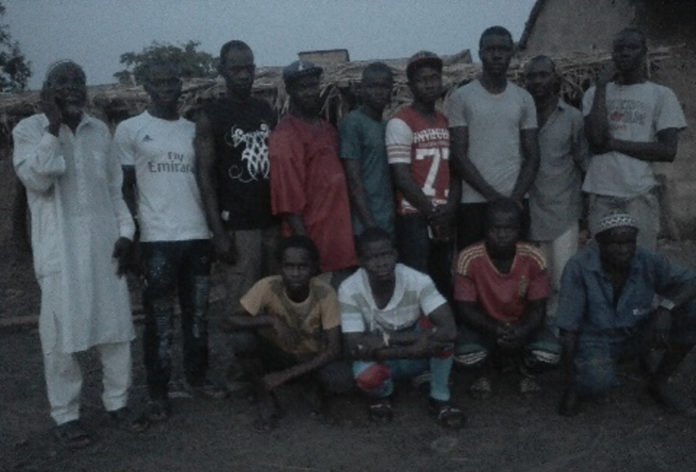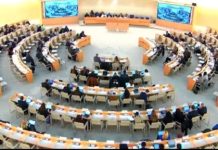By Kebba AF Touray, reporting from Sandu Diabugu, URR
A violent confrontation took place on Friday 2nd November 2018, at Diabugu village in the Sandu District of the Upper River Region. The fracas which is a by-product of an existing caste system, classifies some inhabitants of the village as freeborn and some as slaves.
CAUSES AND CONSEQUENCES OF CONFLICT
According to Alagie Kursa Drammeh the Alkalo of Diabugu, the violence occurred as a result of the decision made by some youth in the village to cease membership of the village youth group; that following the clash, five members of the Drammeh kunda family were taken to the Basse Police station and are currently helping the police in their investigations into the incident.
Police PRO ASP Lamin Njie, confirmed the incident and said it is centred on a caste system that still exists today. He said five people have been arrested and charged with three counts of incitement of violence, prohibitive conduct conducive to breaches of the peace and common assault. He further said that the arrestees informed them that they intercepted certain people to prevent them from entering the village mosque under instructions, adding that investigations are ongoing and the matter will soon be brought to the court.
The five people arrested, according to the villagers are: Muhammed Hydara, Amara Gumaneh, Amara Njie, Ebrima Drammeh and Sinda Njie.
GAINDEH JALLOW’S VIEW
Speaking to Foroyaa, Gaindeh Jallow, a brother to Haruna Jallow, explained that his brother was instructed by the head of the youth group called “Kombo”, to blow the villages traditional horn, for villagers to gather as it is done by their tradition; that his brother Haruna, refused to comply with the tradition and was fined D2,500.
“I paid the fine for my brother, but advised Kombo that such perception should be relegated to history and henceforth we can use loudspeakers to call villagers whenever the need arises,” Gaindeh said.
According to him, the villagers insisted together with his family, Gaindeh should continue to recognise that they belong to the slave class and should play any role assigned to them, failing which they will be denied access to the mosques, water supply and other social amenities and will be banned from attending village ceremonies. “We have been subjected to all forms of inhumane and degrading treatments from those who claim to be the ‘nobles’. Currently, a relative who has come to visit me by the name Papa Sey, has been asked by these people to leave the village on the grounds that he is not a native of Diabugu,” Gaindeh told this reporter.
His brother Haruna Jallow on his part, explained that he went to the mosque for the Friday ‘Jumaa’ prayers and was intercepted at the entrance by some young people, who he alleged to be members of the Drammeh Kunda family. “I told them that I have come to observe Friday prayers, but not to ignite violence. They asked me to leave the mosque and when I insisted, they started beating me. Some villagers intervened and rescued me from them,” he explained; that this move by the attackers was as a result of his refusal to see and accept himself as a ‘slave’. “I sustained general body pain due to the beatings and was taken to the hospital where I was treated. They are demanded that I accept being a ‘slave’, otherwise they will kill me.”
Haruna called on Government to act swiftly and put an end to any reoccurrence of such attacks meted on them by the villagers of Diabugu in particular, the Drammeh Kunda family, if they do not want to see a bloody civil strife in the village, which can spill to other communities.
THE VILLAGE IMAM
Alagie Morry Ceesay, the Imam of the mosque where the incident took place, disclosed that ten minutes before the ‘Jumaa’ prayers, he heard arguments at the entrance and some people advised him to shorten his sermon because of the ongoing violent confrontation.
Imam Ceesay alleged that Gaindeh Jallow was the one who instigated some youth to oppose the tradition of the village, by refusing to be in the ‘slave’ group; that the Police Officers who were ordered to come to the village, effected the arrest of some of villagers who were involved in the fight.
He informed this reporter that Diabugu comprises three broad kinships or “Kabilos” namely, Serna (the Alkalos), Gunjur (the Imams) and Ganyiaga (the traders). He said the Sillahs are the founders of the village; that when they migrated, they handed the village to the grandfather of the current Alkalo.
He called on the ‘slave’ class to respect the customs and tradition of the village, and urged Government to be proactive in dealing with the issue in the right manner.
EDITOR’S NOTE:
GOVERNMENT SHOULD BE HONEST TO THE PEOPLE
The village and villagers of Diabugu are in turmoil. Arrests have taken place. Court action is anticipated. The consequences may have unsettled effects on the people of Diabugu. For fifty three years, Gambians have not been educated by the State to know what is right or wrong under the Law. They only know their traditional or customary norms, but do not know the Laws of the State. It is often said that ignorance of the Law is no excuse. It should be equally said that a State which makes Laws but makes no effort to inform the population to know it’s contents, is a tyrannical State governed by tyrannical Laws.
Sooner or later, those same people will find themselves before the Courts to be fined or jailed for breaking a Law they were not acquainted with. It is important for the educated residents of Diabugu to form a civic society group and go from home to home, to explain the content of Section 16 of the 1970 Constitution and Section 20 of the 1997 Constitution. Both Constitutions state the following in subsections (1) and (2):
“(1) No person shall be held in slavery or servitude.
(2) No person shall be required to perform forced labour.”
Gambia is a member of the United Nations and the Universal Declaration of Human and Peoples Rights, a fundamental Constitutive document of the United Nations, states the following in Article 4:
“No one shall be held in slavery or servitude; slavery and the slave trade shall be prohibited in all their forms.”
Article 8 of the International Covenant on Civil and Political Rights states:
“1. No one shall be held in slavery; slavery and the slave-trade in all their forms shall be prohibited.
- No one shall be held in servitude.
- (a) No one shall be required to perform forced or compulsory labour…..”
This is and International Law which educated Gambians should convey to their fellow citizens for them to know that some of the customs and traditions could only be retained on a voluntary basis and not by might, which could bring them into direct confrontation with the State and the Law. This would lead to arrests, fines and imprisonment that would cause real hostility in villages. This should be avoided.
If outsiders go there to explain this to the people, they would be accused of trying to undermine the customs and tradition of the village. Hence this task of explaining what is provided by the Constitution and how those who refuse to abide by it could be subjected to legal proceedings, should be explained to the people by their own sons and daughters so that it would be easier for everyone to digest.
A Council of the wise from the seven administrative areas of the country, should be constituted with immediacy to visit Diabugu and discuss with all the kinships or Kabilos, to help find a lasting solution to this incident.



















